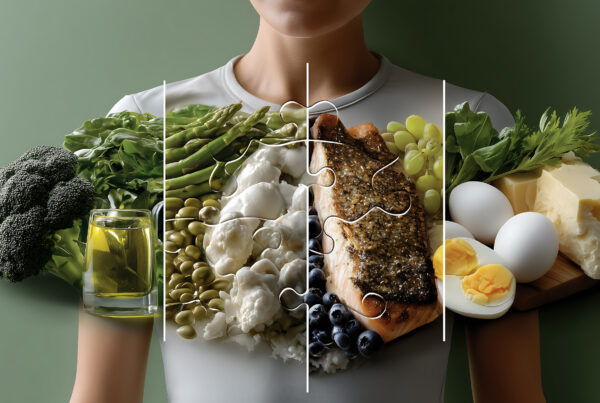”Question: Is there a connection between Alzheimer's and Dementia and the food we put into our bodies?
Reading time: 5 Minutes
MWi Hack:
- Feed your brain by choosing one-ingredient whole foods, eating mindfully without distractions, and chewing thoroughly—simple nutrition changes that reduce inflammation and support your gut-brain connection to potentially cut dementia risk significantly.
MWi Summary:
- Dementia cases are expected to double by 2060, but lifestyle factors like nutrition offer powerful prevention opportunities since we can’t control aging or genetics.
- Your gut is your “second brain” with over 500 million neurons that directly impacts brain health through the gut-brain connection, making food choices crucial for cognitive function.
- Ultra-processed foods damage your brain by increasing chronic inflammation, creating oxidative stress, and disrupting gut bacteria that produce mood-regulating chemicals like serotonin and dopamine.
- Choose one-ingredient whole foods like eggs, apples, fish, and broccoli while eating local and organic when possible to reduce inflammation and support a healthy gut microbiome.
- Practice mindful eating habits by removing distractions, eating with others, chewing thoroughly, and being present during meals to activate rest-and-digest responses that improve brain health.
According to a landmark neurocognitive study completed in 2020, cases of both dementia and alzheimers (a subtype of dementia) are expected to double by the year 2060. While global research is on-going to understand the root causes of these neurodegenerative conditions, key factors such as aging, genetics and lifestyle factors including stress and nutrition are widely accepted by the medical community.
Aging and genetics are often beyond our control, but we have agency over lifestyle. Within lifestyle, what we choose to eat is a powerful contributor to overall health, including the brain.
The healing power of nutrition is well documented. More than 2000 years ago, the Greek physician Hippocrates said “let thy medicine be thy food, and thy food be thy medicine”. We’ve always known healthy eating can improve our quality of life, but how does food affect our brains?
Meet your “Second-Brain”
The Gut-Brain connection is one of the most dominant in the human body. According to the Cleveland Clinic, “With more than 500 million neurons, it’s the most complex neural network outside of your brain. It’s also unique in that it can operate somewhat independently from it and your central nervous system. This has led some scientists to refer to it as a “second brain”.
A growing body of scientific evidence suggests that consuming ultra-processed foods and poor nutrition is linked to a higher risk of neurodegenerative diseases. These foods:
- Increase chronic, systemic inflammation: a key contributor to disease, including cognitive decline, impaired cognitive function and reduced memory and decision making abilities.
- Multiply oxidative stress: The National Institute of Health states “oxidative stress can lead to various pathological conditions and human diseases, especially neurodegenerative diseases”.
- Compromise the gut microbiome: Known as “dysbiosis”, one of the key negative outcomes is altered neurotransmitter production. This includes serotonin and dopamine affecting mood, behavior and mental health. Notice that a “digestive issue” is affecting brain chemical and hormone function!
Back to Basic Training
We’ve briefly established connections between nutrition (or lack thereof) and brain health. Now what? Here are some simple (not easy) concepts that can help you change your body and your brain:
1) Upgrade your food quality: (changes your gut microbiome and reduces inflammation)
- Choose one-ingredient foods like eggs, apples, fish, broccoli and water. The closer you can get to one ingredient foods, the closer they are to being “natural by design” leading to better health.
- Eat local and organic when possible. The longer a whole food stays connected to GOOD soil, and the shorter it has to travel to get to your table, the better.
2) Enjoy your meals: (mitigates fight or flight responses and increases rest and digest mechanisms)
- Be present: Take a breath and give thanks. Remove your phones and tech. Distracted eating increases stress and reduces healthy digestion. Gratitude literally rewires the brain, lowering symptoms of anxiety and depression and enhancing emotional regulation.
- Eat with others: Harvard University states, “shared meals may be a more reliable indicator of well-being than income”!
3) Chew your food: (digest more, eat less = better microbiome)
- Increases surface area for enzyme action and nutrient absorption
- Reduces unnecessary strain on the digestive system (good for the brain)
- Shuts off the hunger alarm helping to regulate overeating
Take it one bite at a time
Admirals and generals aren’t pinned overnight, it’s a function of compounding, a force Albert Einstein called one of the most powerful in the universe. Seemingly small, insignificant choices, made consistently over time that produce big results. Your positive small choices now (slowing down, choosing water instead of a sugary drink or a slice of watermelon over a cookie (known as food swaps) or breaking bread with a loved one, improve cognition, mental health and quality of life. And they just might help you reduce the risk of brain based diseases. A win now strategy with a possible bonus later!
It’s not about nutritional perfection. Enjoy those treats and make the moments and the calories count. But please do try to feed yourself and your loved ones well. Consistent research tells us your body, and your brain will be better for it.
Through our responsive content and dedicated support, MWi continues to serve the modern military and Veteran community by providing relevant, practical strategies for enhancing connection and wellness.
Click below to see more MWi articles and click the ‘Press Resources’ button to Embrace Your Potential with our content partner Press.






